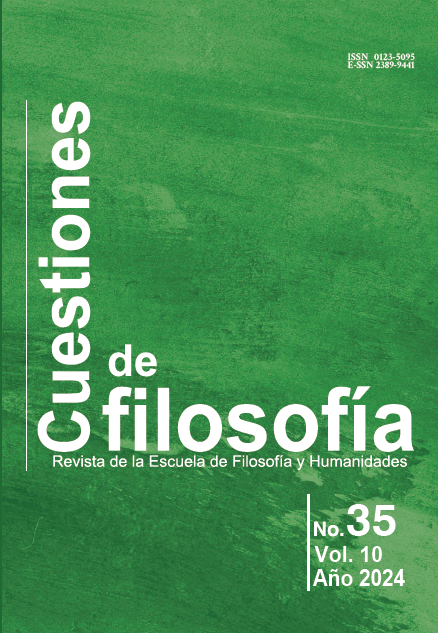Technique, communication and subjectivity. On Marshall McLuhan and Régis Debray

Abstract
The article aims to analyze the relationship between technique and subjectivity, based on the work of two authors who emphasize the communication processes inherent in this relationship. It identifies some common traits in their thinking while highlighting their differences. The concept of “medium” in Marshall McLuhan, understood as a constitutive agent of subjectivity, is discussed. The article also addresses certain aspects of Régis Debray’s mediology in relation to the issue at hand and reviews the criticisms he directs at McLuhan from the notion of “transmission”. This critique is examined and the common aspects of their works, which in this article are more relevant than their differences, are highlighted, especially in the light of Jean Baudrillard’s observations on communication as a fundamental realization of contemporary technique and subjectivity.
Keywords
technology, social media, culture, communication history
References
- Agustín, S. (2012). Las confesiones. Madrid: Tecnos.
- Allen, W. (Dir.). (1972). Everything You Always Wanted to Know About Sex (But You Were Afraid to Ask) [Film]. Jack Rollins and Charles H. Joffe Production.
- Bataille, G. (1975). Teoría de la religión. Madrid: Taurus.
- Baudrillard, J. (2001). El otro por sí mismo. Barcelona: Anagrama.
- Baudrillard, J. (2009). El crimen perfecto. Barcelona: Anagrama.
- Borges, J. L. (1996). Obras completas II. Buenos Aires: Emecé.
- Carlier, P. (2005). Homero. Madrid: Akal.
- Dagognet, F. (2001). Une boussole philosophique. Les Cahiers de Médiologie, 1 (11), pp. 6-15. https://doi.org/10.3917/cdm.011.0006
- Debray, R. (1994). Vida y muerte de la imagen. Historia de la mirada en Occidente. Barcelona: Paidós.
- Debray, R. (2001). Introducción a la mediología. Barcelona: Paidós.
- Engels, F. (1955). El papel del trabajo en la transformación del mono en hombre. K. Marx, y F. Engels, Obras escogidas. Tomo II (pp. 74-87). Moscú: Progreso.
- Freud, S. (2010). El malestar en la cultura. Madrid: Alianza.
- Gubern, R. (1996). Del bisonte a la realidad virtual. Barcelona: Anagrama.
- Guzmán, N. (2020). Coribantes y cabiros. Escritos sobre la filosofía y lo sagrado. México: Texere.
- Guzmán, N. (2020). La desilusión del mundo y la muerte de la imagen. A propósito de Baudrillard y Debray. Reflexiones Marginales, 56. https://revista.reflexionesmarginales.com/la-desilusion-del-mundo-y-lamuerte-de-la-imagen-a-proposito-de-baudrillard-y-debray/
- Guzmán, N. (2022). La rebelión de los objetos técnicos y el simulacro. Latin American Journal of Humanities and Educational Divergences, 2 (2), pp. 1-21. https://revistas.jjsanmarcos.org/index.php/lajhed/article/view/14/179
- Guzmán, N. (mayo de 2024). La sombra que resplandece. La insondable experiencia del yo en la filosofía moderna. Reflexiones Marginales, 81,https://reflexionesmarginales.com/blog/2024/05/28/la-sombraque-resplandece-la-insondable-experiencia-del-yo-en-la filosofiamoderna/
- Hegel, G. W. (1989). Lecciones sobre la filosofía de la historia universal. Madrid: Alianza.
- Heidegger, M. (2010). La época de la imagen del mundo. Caminos de bosque (pp. 63-90). Madrid: Alianza.
- Heródoto. (1977). Historia. Libros I-II. Madrid: Gredos.
- Jünger, E. (2003). El trabajador. Dominio y figura. Barcelona: Tusquets.
- Kane, O. (2016). Marshall McLuhan et la théorie médiatique: genèse, pertinence et limites d’une contribution contestée. tic&société, 10 (1), pp. 1-17. https://doi.org/10.4000/ticetsociete.2043
- Leroi-Gouhran, A. (1971). El gesto y la palabra. Caracas: Universidad Central de Venezuela.
- McLuhan, M. (1996). Comprender los medios de comunicación. Las extensiones del ser humano. Barcelona: Paidós.
- McLuhan, M. (2011). The Gutenberg Galaxy. The Making of Typographic Man. Toronto: University of Toronto Press.
- McMylor, P. (2018). Liminal Contexts and Critical Insights: The Cases of McLuhan and Debray. J. E. Castro et al. (Eds.), Time, Science and the Critique of Technological Reason (pp. 209-230). Cham: St Antony’s Series / Palgrave Macmillan.
- Merzeu, L. (1998). Ceci ne tuera pas cela. Les cahiers de médiologie, 6 (2), pp. 27-39. https://doi.org/10.3917/cdm.006.0027.
- Merzeu, L. (2001). Techinques d’adoption. Les cahiers de médiologie, 11 (1), pp. 185-191. https://doi.org/10.3917/cdm.011.0185.
- Olson, D. R., y Torrance, N. (1991). Cultura escrita y oralidad. Barcelona: Gedisa.
- Rialland, I. (2007). Constater/contester. Régis Debray et le débrayage médiologique. Acta fabula, 8 (3). https://10.58282/acta.3444
- Saussure, F. d. (1980). Curso de lingüística general. Buenos Aires: Losada.
- Strate, L. (2012). El medio y el mensaje de McLuhan. La tecnología, extensión y amputación del ser humano. Infoamérica. Iberoamerican Comunicatio Review, 7-8, pp. 61-80. https://dialnet.unirioja.es/servlet/articulo?codigo=4274883
- Valerdi, L. M., Arreola Villarruel, M., y Argüello García, J. (2019). Interfaces Cerebro-Computadora: Conceptualización, Retos de Rediseño e Impacto Social. Revista mexicana de ingeniería biomédica, 40 (3), pp. 1-18. https://doi.org/10.17488/rmib.40.3.8
- Vernant, J.-P. (1992). Los orígenes del pensamiento griego. Barcelona: Paidós.
- Vučkovič, B. B. (2020). McLuhan and Debray. Theoretical (Dis)Harmony. Socioloski pregled, 54 (4), pp. 1311-1328. https://doi.org/10.5937/socpreg54-29186